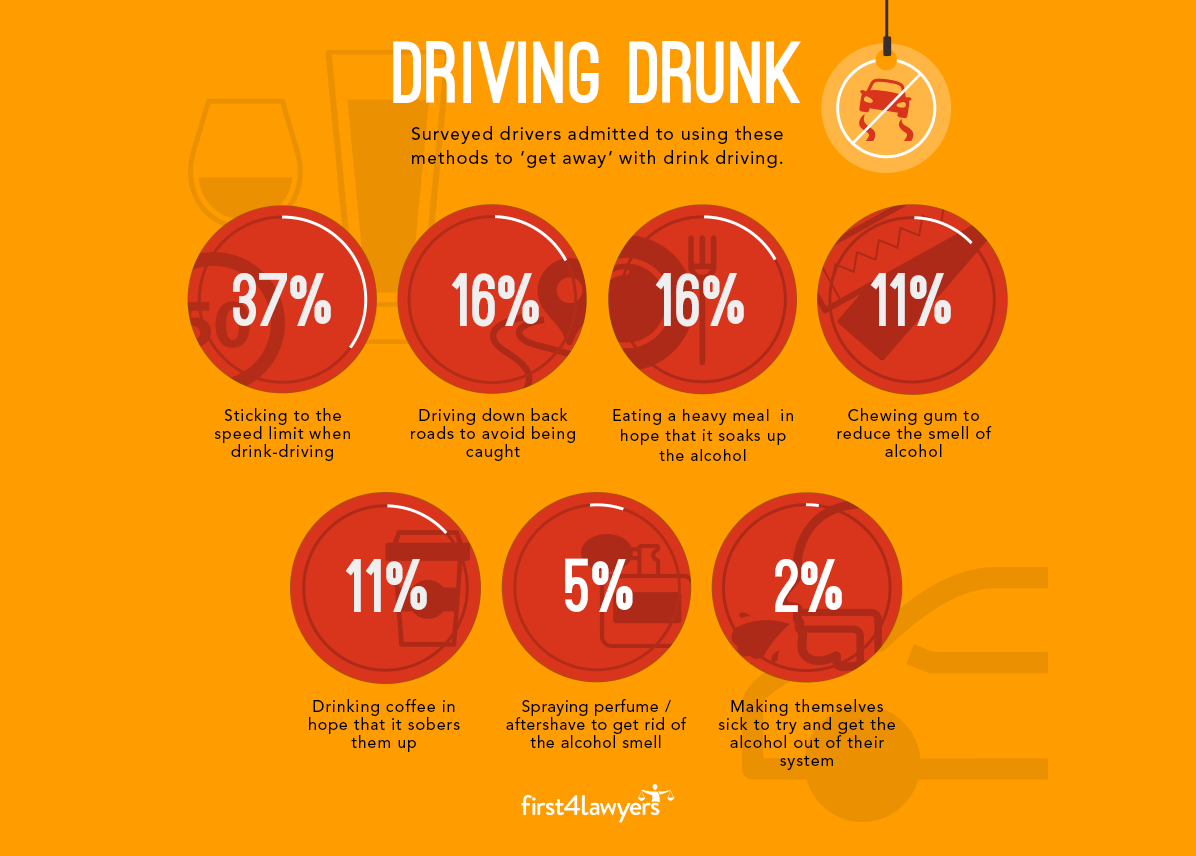Drink-Drivers Admit to a Variety of Tactics to Avoid Being Caught

First4Lawyers surveyed 2,000 drivers to explore bad driving habits in the UK.
The study reveals that drink-driving continues to occur, as does speeding and using mobiles while driving, despite new laws passed in 2017.
- 29% of drivers confess to drink-driving.
- Drink-drivers admit to a variety of tactics to avoid being caught.
- Drivers are using phones while driving including making calls, sending texts, using Snapchat and even taking selfies.
- 70% admit to going over the legal speed limit despite the increase in fines.
- 69% confess to slowing down just for the cameras and speeding back up again afterwards.
Drink-driver confessions
Despite repeated campaigns and crackdowns against drink-driving, it appears that for almost a third of people the message just isn't getting through.
Our survey showed that 29% of drivers admitted to drink-driving and 73% admitted they don’t even know what the legal limit is.
It seems people are prepared to take the risk of getting in their car after drinking alcohol, particularly when it's the morning after the night before. Many are unaware that they could still be over the legal limit the next day and a shocking 75% saying they drive while hungover. According to our research, young drivers are the biggest offenders of this.
As well as getting behind the wheel, driver admit to employing all sorts of tactics to avoid getting caught:
- Sticking to the speed limit when drink-driving to ensure they don’t get pulled over - 37%
- Taking back roads to avoid the police - 16%
- Eating a heavy meal after drinking in the hope that it soaks up the alcohol - 16%
- Chewing gum to mask the smell of alcohol - 11%
- Drinking coffee in an attempt to sober up before getting behind the wheel - 11%
- Spraying perfume/aftershave to get rid of the alcohol smell - 5%
- Making themselves sick to try and get the alcohol out of their system before driving - 2%
Bystanders and friends have a fair bit to answer for as well:
- 19% of Brits say they wouldn't stop a stranger from getting into their car after drinking more than the limit.
- 17% wouldn't prevent a friend from drink-driving
- 10% wouldn't even stop a member of their family.

Breaking the speed limit
In 2017, the fines for breaking the legal speed limit were increased by 175% in an attempt to reduce the number of offenders. Speeding drivers now receive six penalty points and a possible £1,000 fine.
Despite this, 70% of respondents continue to speed, with almost half saying that is likely to be on a motorway:
- 69% admit they slow down until they've passed the cameras, then speed up again.
- 44% keep a look out for unmarked police vehicles.
Mobile phones
Similar to speeding, the penalty for anyone caught using their phone while driving was also increased in 2017. You can get 6 penalty points and a £200 fine if you use a hand-held phone when driving. You’ll also lose your licence if you passed your driving test in the last two years.
If it goes to court you can be fined up to £1,000.
Yet our data reveals 61% of drivers say the new law hasn’t stopped them doing it. In fact, they admit to mobile activities while driving, such as:
- Making a call without the use of hands-free - 19%
- Texting - 17%
- Using Facebook - 5%
- Snapchat - 3%
- Taking selfies - 3%
Comment
Andrew Cullwick, spokesperson for First4Lawyers, said: "Our research reveals that a disturbing number of drivers believe they are above the law, despite the danger they pose to themselves and other drivers by breaking the rules of the road. Driving drunk, speeding and using a mobile behind the wheel are all illegal, yet it appears that repeated attempts to crack down have been largely unsuccessful.
"It can only be hoped that the increase in the death by dangerous driving sentencing, from 14 years to a life sentence, will act as a deterrent to those risking the lives of other road users through their dangerous actions."
The survey was conducted by OnePoll and commissioned by First4Lawyers.
2,000 respondents across the UK were surveyed between the dates of 1 and 3 November 2017.

